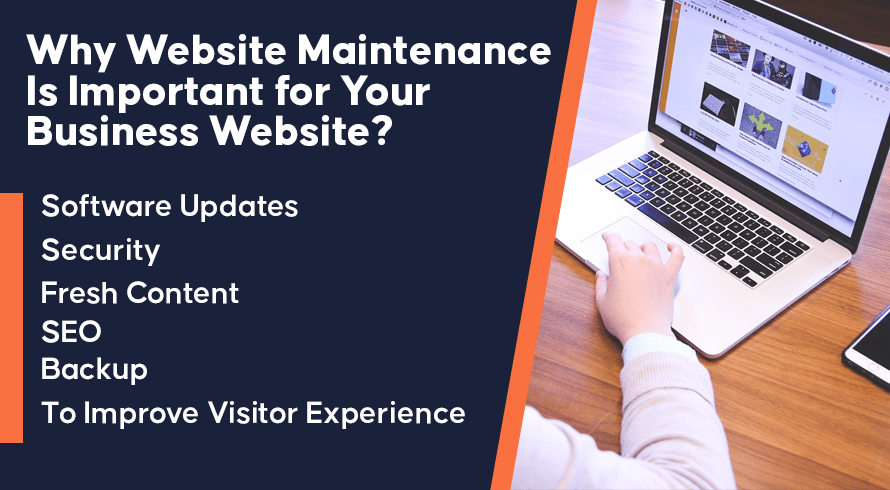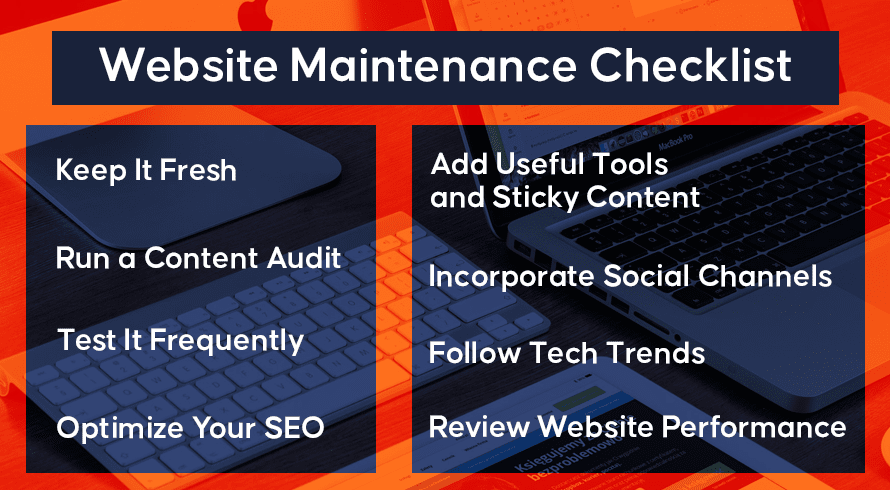Inquivix HQ
1-903, 18 Eonju-ro 146-gil,
Gangnam-gu, Seoul, Korea
06057
Maintaining your website is one of the most important things you can do to ensure its success. Just like you would take your car in for a tune-up, you need to periodically maintain your website. This involves making sure all the components are working properly, updating software and plugins as needed, and ensuring that your content is fresh and up-to-date.

A website is your business’s face online. It is where all your audiences will come to learn more about you, your products and services, and how to contact you. If your website is outdated or poorly maintained, it will reflect badly on your business. You need to make sure that your website is always in top condition.
Whether your business is small or big, it will require website maintenance. But what exactly is it? How do you keep a website up and running? What are some of the key advantages? Let’s dig into this topic in greater depth and address all important questions.
What Is Website Maintenance?
The tasks necessary to maintain your website working effectively and up to date are referred to as website maintenance. It involves regularly checking your website for issues, correcting any issues, and making updates. Website maintenance is important for ensuring your website runs smoothly and looks great. It can also help protect your website from security threats.
You must perform regular inspections on your website in order to ensure it is in a good and relevant state. Not once a year, not twice a year. We’re talking about ongoing monitoring that will allow you to maintain your company’s operations smoothly and your customers to have a pleasant user experience. Website maintenance is key to keeping your site organized, updated, and running like a well-oiled machine.
Why Website Maintenance Is Important for Your Business Website?
Regular website maintenance is important for your business website to ensure that it runs smoothly and efficiently. By having a website maintenance plan in place, you can rest assured that any issues or problems that may arise will be taken care of quickly and professionally. Here are just a few of the many reasons why website maintenance is so important.

Software Updates
Today’s websites, despite their simplicity of modification, are intricate software programs. They, too, must be up to date for security and performance reasons, much like your computer’s operating system. This means that the core software must be updated regularly as well as any plugins and themes. Especially a WordPress website will need to be constantly updated with new plugins, at least once a month. Always back up before making any major changes to your website. This way, if something goes wrong, you can revert to a functioning site version.
Security
The majority of today’s online domains contain thousands of lines of code and rely on specialized software provided by your web hosting service. Hackers frequently discover coding issues that they may use to their advantage, trolling the Internet for websites that appear to be vulnerable.
You may help prevent this by keeping your web hosting server’s and website’s software up to date with the most recent patches and security updates. You’ll also need to remove the virus, restore the data, and clean up the site in the event that your website is hacked (even with all of your security precautions taken, this is never a guarantee).
Fresh Content
The material on your site should entice people to return. Nobody wants to read the same thing every week or browse outdated information about an event that occurred three months ago. You’re essentially telling potential customers that you aren’t paying attention to your company if you don’t update your website, and you may even be giving them the impression that your business might not be performing well.
SEO
The most popular search engines like sites that are quick, error-free, well-kept, and above all, constantly updated with fresh material. As a result of this, you’re providing the search engines new content with which to rank your site every time you modify it. You must make certain that your website is kept up to date regularly. Another factor that influences SEO is website speed. Regular maintenance service would ensure that your website is operating at optimum speed.
Backup
In case something goes wrong with the site and it has to be rebuilt or reactivated, all websites should be backed up regularly. It’s important to back up your site’s code anytime you modify or update it, as well as any time your content management system (CMS, such as WordPress) releases a new upgrade. Sometimes the hosting providers offer automated backups but it is always better to keep your eye on it. At the very least, you should back up your data quarterly.
To Improve Visitor Experience
Your website is a clear reflection of your corporate image. Because customers frequently research a company’s website and social media accounts before taking further action, it’s often the first impression they have of your organization. It’s critical that your website fulfills the needs of your site visitors!
A badly functioning website is an obstacle for your business and the image you wish to project to potential new customers, as well as existing clients and consumers. Examine the appearance and feel of your website on a regular basis and update it to reflect your corporate style.
How Much Does Website Maintenance Cost?
There are various website maintenance costs based on the purpose of your website, the size of your audience, and how much content is hosted. Different website maintenance services will require different costs. Web maintenance packages generally, base their costs on the scale of your website.

A small or personal website will not have a lot of visitors or demands, and it will not require much maintenance. It’s possible to run a small blog on Google Blogger with no expenses involved. Alternatively, self-hosting may be accomplished using a platform like WordPress, which has low monthly fees owing to domain name renewal and hosting service charges.
If you are using a large, customized website, like an eCommerce site, you’ll need to be more diligent about website upkeep. This will be a larger financial commitment, as you’ll have to keep an eye on your web presence.
Website Maintenance Checklist
There are many aspects you need to keep track of when you are doing web maintenance. You can use the following website maintenance tasks as your checklist.
Keep It Fresh
A website is an important aspect of any business, whether it be a small startup or a large corporation. As the web evolves, so must your website in order to stay current and maintain your online presence. A stale website will quickly lead to a loss in customers and traffic.
Websites must be updated on a regular basis to provide people a reason to return. A defunct website implies that the firm is no longer operating. To acquire traffic, try experimenting with modern web design trends and producing engaging material. News, blogs, and reviews are effective methods to keep your users up to date. You might utilize your posts to reply to questions in your area of expertise.
Run a Content Audit
You spend a whole lot of time putting out material. Some items are masterpieces, while others are just not so well done. On a regular basis, keep track of content metrics and evaluate your efforts to ensure high-performing material. This will allow you to make simple modifications that will support future content marketing initiatives.
Schedule content audits on a regular basis to double-check your material. Organize your material and use project management tools to manage, track, and report on the process.
Take the time to assess how well your site’s content fits with your publishing goals. Make sure that your material’s tone is consistent with the brand’s identity. Adapt your content to individualize it for the consumer, making them feel as if it was written specifically for them.

Test It Frequently
An effective website is not just important for the way your brand communicates with customers; it’s also essential for how well your company delivers digital interactions. It’s not easy to improve the effectiveness of a site unless you stay on top of behavioral changes and website usability by conducting user tests.
Don’t forget to test your site for functionality as well. Examine how your plugins integrate with the website and confirm that all features are in working order. Is the website responsive on a variety of devices? You’ll discover how to improve your site’s functionality and customer experience once you run tests.
Optimize Your SEO
The search engine results page (SERP) is the first thing that Google users see when they search in your industry. There are a variety of aspects to consider when optimizing your Google ranks. What exactly are a meta description, alt text on pictures, and internal links to content? If you create high-quality material, on-page SEO can assist improve your website’s ranking on SERPs.
Add Useful Tools and Sticky Content
A company’s website may accomplish much more than just making sales. You can connect with consumers when they offer their contact information if you utilize the appropriate methods. There are numerous apps, chatbots, and other technologies that can be used by a firm to obtain consumer information and interact with them. Incorporate technology that will help you develop closer connections with your consumers.
Incorporate Social Channels
Customers frequently engage with a company or brand through several channels. They will look at a website on their desktop or mobile device and seek information across social media and other applications. You may use these platforms to boost your site’s traffic.
You can use the “share this” buttons to give your readers more interactivity with your content. You may connect to relevant pages on your website via corporate accounts on Facebook, Twitter, and Instagram. A website may also integrate components from social media platforms. You earn the consumer’s trust by obtaining feedback about your company from an external source.
Follow Tech Trends
A website needs to keep up with the latest developments in information technology and follow trends. In order to compete with others in your niche, you need to be on top of the trends happening in the tech world, especially related to your website.
A major advantage of following tech trends is cybersecurity. By keeping your website secure, you show search engines that it is not a security risk and thus prevent it from classifying it as such. This will help your website perform better.
Review Website Performance
To obtain an accurate picture of your site’s performance, utilize tools like Google Analytics or other analytics plugins. Analytics can show how a customer comes to a business’s website, the pages they view, and the keywords they search for. You may also gather data on contact interactions with the use of consumer engagement management software.
A company may gather data from several sources with other data quality solutions. Most significantly, data quality software can guarantee the accuracy of that information. Check your website’s performance on a regular basis by looking at metrics. It is easier to discover variables that influence the success and development of a company’s website using analytics and data mining.
Conclusion
There’s a reason website maintenance is so important – it keeps your site running smoothly, ensuring that your visitors have the best possible experience. By keeping your website up-to-date, you’re also protecting yourself from security risks and showing Google that you’re taking care of your business.
Website maintenance doesn’t have to be expensive or time-consuming. If you schedule regular web maintenance tasks, it would be a lot less work and you can be assured that your website is running optimally.
